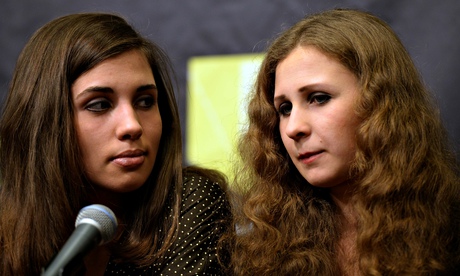
Two members of the feminist group Pussy Riot are suing the Russian government in the European court of human rights (ECHR) over their imprisonment for a 2012 "punk prayer" protest at a Moscow cathedral.
Maria Alyokhina and Nadezhda Tolokonnikova, who were given an amnesty in December after serving 21 months in prison and pre-trial confinement, are demanding €120,000 (£71,000) each in compensation, plus €10,000 in court fees. They argue that the investigation and prosecution violated their rights and amounted to torture.
"They didn't get fair trial here in Russia so they want to get it finally in the European court of human rights," said Pavel Chikov, the head of the human rights legal group Agora, which is representing the two women.
"Plus they want this case to set a precedent that Russians can speak publicly on sensitive political issues, even if this speech is not supported by majority. This is a case about freedom of expression and fair trial first of all."
Pussy Riot came to the world's attention with their protest on 21 February 2012, when they attempted to perform their song Mother of God, Drive Putin Out in Christ the Saviour cathedral near the Kremlin. Three members of the group were convicted of hooliganism and sentenced to two years in a prison colony in a trial that was widely and sympathetically covered by western media.
The vast majority of Russians, however, were disapproving of Pussy Riot's actions. According to surveys during the trial, 86% of Russians thought its members should be punished. Most favoured a large fine or forced labour.
Yekaterina Samutsevich was given a suspended sentence in October 2012, while Alyokhina and Tolokonnikova served time in far-flung prison colonies, where they went on hunger strike in protest against the harsh conditions they faced. Tolokonnikova also corresponded with the left-wing philosopher Slavoj Žižek in an exchange of letters due to be published in September. They were released in December in what was largely viewed as a gesture of goodwill by the Kremlin before the Sochi Olympics.
The activists, who initiated the complaint in 2012, argue that Russia violated four articles of the European convention on human rights guaranteeing the rights to freedom of expression, liberty and security and a fair trial, and prohibiting torture.
The ECHR's questions to the Russian government on the case earlier this year suggested that the harsh schedule of trial hearings, the glass cage in which the defendants were kept and the heightened security measures could be considered inhumane treatment.
Transport from the court to pre-trial detention took up to four hours, and the women were accompanied by law enforcement officers with dogs at all times.
"People saw them in a glass cage all the time next to police dogs, and the whole thing proved to everyone that they were guilty before they were found guilty by the court," Chikov said. "The practice in Russia where people are put in glass or metal cages in the courtroom has nothing to do with a fair trial and violates the presumption of innocence."
In a 35-page response in June, the Russian government called the complaint "obviously unfounded", arguing that the glass cage is a practice used in other countries and that the imprisonment was a "side-effect" of its desire to protect Russian Orthodox worshippers' freedom of belief.
"Deliberately provocative behaviour in a place that is dedicated to the spiritual needs of believers and is a symbol of the Russian Orthodox community clearly undermines tolerance and cannot be seen as a normal, sincere exercise of the rights of the convention," it said.
Chikov said that he expects to win the suit, after which his clients will seek to overturn their criminal conviction in the Russian courts. Alyokhina and Tolokonnikova have pledged to give any compensation they receive to human rights organisations, including their own group dedicated to prison system reform.

